 |
 |
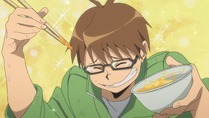 |
I’m guessing that’s the first time in anime we’ve heard the line, “Dammit – how can something so tasty come out of an anus?!”
OP: “Kiss you” by miwa
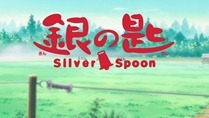 |
 |
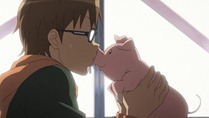 |
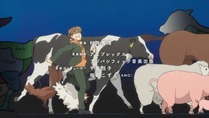 |
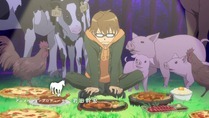 |
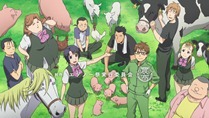 |
Just to review, here are a few of the superlatives with Gin no Saji:
- Winner of the Manga Taishou Grand Prize
- Winner of the Shogakukan Manga Award
- 7th best-selling title in japan in 2012
- Fastest Shogakukan title in history to reach 1 million volumes sold
Needless to say, Silver Spoon is a prestige title. It combines commercial and critical success in a way few manga can, and seems a fitting series to welcome NoitaminA back to the schedule (halfway back, anyway). As if all that weren’t enough it also springs from the pencil of Arakawa Hiromu, who authored one of the most beloved titles in manga, Fullmetal Alchemist – a series which spawned not one but two highly-successful anime adaptations, the second of which was arguably the best shounen anime adaptation before Madhouse’s Hunter X Hunter came along.
It could be said that there was a lot of pressure on A-1 Pictures and director Itou Tomohiko, whose previous works as director are SAO and Seikimatsu Occult Gakuin. With a manga this beloved, there’s a perception (largely inaccurate) that all a director has to do is not screw it up. That’s certainly part of the challenge, but it’s far more difficult than most believe to find the essence of what makes a great manga great and capture it in anime. So far, the early returns are excellent. Based on the premiere, Itou-sensei didn’t screw it up, and created a world that was both inviting and amusing.
One of the things that makes Gin no Saji so well-received, I suspect, is that it packs a lot of obvious sincerity. Arakawa-sensei grew up on a farm in Hokkaido, and her knowledge of this world and affection for it are clear from the moment the story begins to unwind. Because Arakawa is who she is Silver Spoon is classified as a shounen, but if such things matter (I think they’re overrated, personally) it seems very much a seinen title to me. To say it represents a departure from FMA is an understatement, but in its way I think the world of Gin no Saji (the title is a reference to the “silver spoon” newborns in Europe – when it was an agriculturally-driven continent – were given at birth, to symbolize the hope that they never go hungry) is almost as strange to most modern Japanese as that of FMA. One of the cornerstones of GnS is the disconnect modern people have from the source of their sustenance – the dirt, the dung, the blood. For most of modern history agriculture has been an immediate reality of life for most people – in the last Century that’s changed radically, and nowhere more radically than in Japan, where the flight of the young to Tokyo has been an increasing reality in recent decades.
Personifying this disconnect is main character Hachiken Yuugo (Kimura Ryouhei). We don’t learn too much about him just yet, but we know he’s a city boy from Sapporo who’s enrolled at Ooezo Agricultural High School, somewhere in rural Hokkaido. From the start it’s clear this is a classic fish-out-of-water situation – Hachi-kun seems to have no knowledge of how to deal with animals, 5 AM wake-up calls, Phys-Ed classes taught by Major Armstrong look-alike Todoroki Gou (fantastic in-joke getting Utsumi Kenji to do the voice – and a fine tribute to Utsumi-san, who sadly passed away last month, making this his final role) with 20 KM runs and the reality of where eggs come from (it’s not a pretty picture). While he’s clearly more comfortable in conventional subjects such as math – an area where he seems to be far ahead of his classmates – it’s agricultural matters that are the main focus of life at Ooezo. Hachiken’s classmates all express a desire to achieve successful careers in agriculture, many carrying on their family’s farming business – it’s clear these are not ignorant bumpkins but modern farm kids with a mind towards succeeding in the 21st-Century. Just what Hachiken wants – and what he’s doing at Ooezo in the first place – isn’t made clear, but he seems to express a certain disdain at the idea of having goals.
Life at Ooezo is hard, right from the beginning, and students are immediately thrust into the thick of it. First-years are immediately split up into groups of five students for work on “practicals” – which seem to double as first-hand experience at agricultural method and free labor for the school’s for-profit farming activity. Hachiken’s teammates are a cross-section of kids from family farms, and one, Aikawa Shinnosuke (Shimazaki Nobunaga) who dreams of being a veterinarian. Hachiken most takes notice, however, of Mikage Aki (Miayki Maire), a horse-loving girl and the neighbor of one of his classmates, seemingly destined to be the primary love interest in the story.
It’s not so much that any wheels are re-invented in the premiere, but it’s a matter of that word again – sincerity. Hachiken’s struggles with runaway calves and glasses and hair-chewing horses, and his (and Aikawa’s) squeamishness at what happens to chickens are genuine and believable. Silver Spoon is quite funny and resolutely earthy, and it seems intent on showing both the idyllic and harsh nature of agricultural life. Deplorable conditions at poultry farms are mentioned in the premiere, and the OP suggests the struggle for Hachi-kun as he realizes that the bacon and steak he enjoys so much comes from cute little piggies and calves. This is a world that’s mostly unseen and unknown for most of us, and certainly one almost never visited in anime (even Moyashimon is a much more conventionally urban setting) – one of many reasons why GnS looks to be a fascinating change of pace both for Arakawa and for the medium itself. Fittingly for a series focused in the farm, a big part of the magic of Silver Spoon is that it feels so fresh, and despite the high expectations this is a premiere that doesn’t disappoint in the slightest. All the signs point to this being one of the best shows of the season, if not the year.
 |
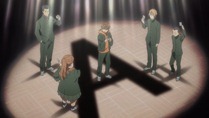 |
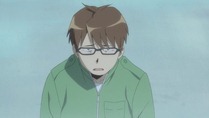 |
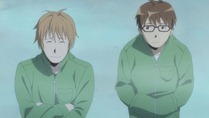 |
 |
 |
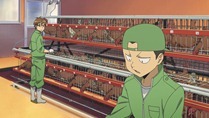 |
 |
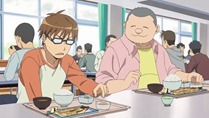 |
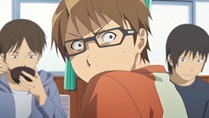 |
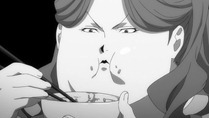 |
 |
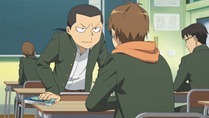 |
 |
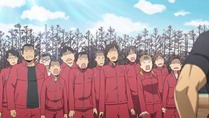 |
 |
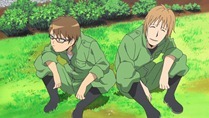 |
 |
 |
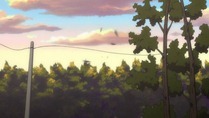 |
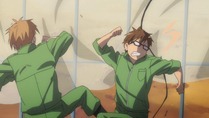 |
 |
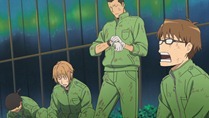 |
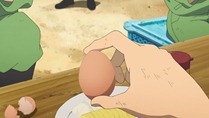 |
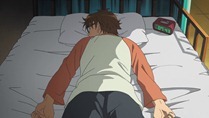 |
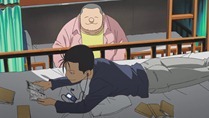 |
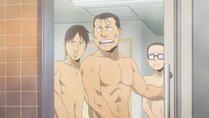 |
ED: “Hello Especially” by Sukima Switch
 |
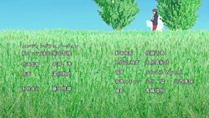 |
 |


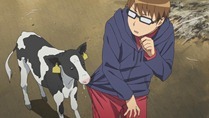
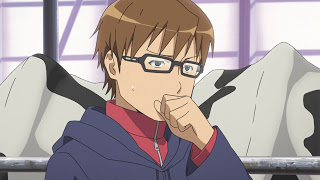
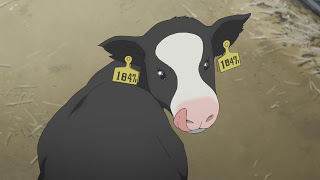
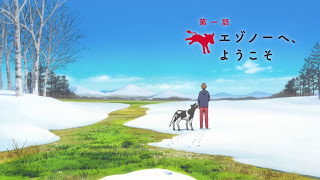
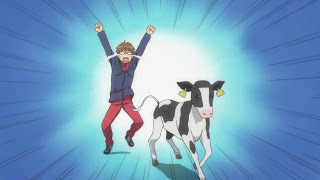
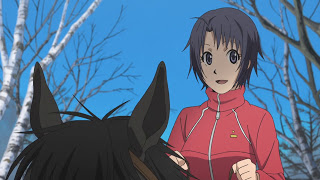
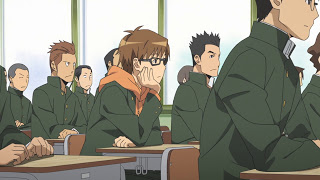


ishruns
July 12, 2013 at 9:39 amThe last of the five animes I was looking forward to this season and like the others it lives to expectation. I laughed a stone out at Armstrong's cameo and Hachi's face when he heard his group member's talk about cloning when the ponytail guy in front of him had just asked what x was.
I also found the conversation that the efficient chicken delivery system was criticized in the West. If that West includes US then it should be taken back. I've seen Food Inc. and that showed way worse stuff.
Great start and being Arakawa-sensei, the best is probably still to come.
Just one thing on FMA: I still feel its a better adaptation than H x H, primarily because its one long story with such well connected arcs that its difficult to discern any break or let up. H x H has a more traditional arc based style. I think it depends on the viewer's taste: a fantasy epic or a set of amazing adventures, whichever they prefer they'll like more.
Snuckerpooks
July 12, 2013 at 12:24 pmThere are a LOT of people that protest the way chicken eggs are farmed. I'm sure Food Inc. highlighted the reasons; sanitary being the biggest issue.
I also had a good laugh when Armstrong's look-a-like. I love even more that it is the same voice.
Zeta Zero
July 12, 2013 at 2:02 pmThere are also the Free Range eggs available in city supermarkets (and all the associated guilt-trip/conscience marketing that comes with them).
Simone
July 12, 2013 at 3:29 pmI can tell you that here in Britain free range eggs are so common it's almost more the rule than the exception to buy them… I don't have first hand experience of the actual differences between the two (as in, if there is any significant difference in taste or health value), but it's apparent how bad breeding practices can cause health concerns (the most blatant case being the "mad cow" disease outburst a few years ago). It all boils down to the fact that you probably can't demand 'too much' from the ground; trying too hard to increase production ends up taking its toll.
ishruns
July 12, 2013 at 9:15 pmAll good points but as a city forever kid, I know that chicken eggs come from the anus. After in Chicken Invader 1,2,3,4 it is clearly depicted as being so.
jim
July 12, 2013 at 11:03 pmFrom what I've heard, "free range" is about as reliable of a term as "all natural."
Simone
July 12, 2013 at 10:11 amI liked the premiere a lot too, though it seems to have been quite divisive. I think this is something that affects mostly a public with whom these themes don't resonate much (I've read someone saying that "no one can be as stupid as to not know where do eggs come from". I don't know where that blogger is from, but he/she probably is closer to a rural reality than one might think. I've seen chickens when I was a child; but I have heard real accounts of city children genuinely thinking that milk was 'fabricated' somewhere and not even considering cows as part of the process).
I also like how one of Arakawa's themes from FMA carries and is probably going to be fully developed here: the disconnect between eating meat and the actual harshness of killing an animal. In FMA, this is addressed beautifully in a small scene, when Ed and Al are stranded on the island where their master put them for training, and are forced to learn how to kill even cute rabbits in order not to die of hunger – and this realization is part of the overall understanding of how they and their material bodies are nothing but part of the cosmic flow of elements and energy – one is all, all is one. I also liked how genetic engineering was brought up. It made me think that Arakawa probably has experience of that subject as well thanks to her agricultural background, and quite possibly this has carried into the issues on the ethics of science she discusses in FMA. Chimeras, 'artificial humans'… there's a lot going on in there already. One of the reasons why I love FMA so much (and why I still prefer FMA: Brotherhood to HXH, by a tiny bit. Even though HXH is probably the superior adaptation if we just consider as a parameter how well the manga was transported to screen. The first 10 or so episodes of Brotherhood are its downfall).
admin
July 12, 2013 at 10:59 amWell, as I said in the post I think that disconnect between urban moderns and the food that sustains them is a major theme of the series. And frankly, I think it's absurd to say a city kid wouldn't know that eggs come from a hen's anus. I'd be willing to bet that 70% of Tokyo 1st-year high schoolers don't know that, and I can pretty much tell you that percent of American big city kids don't.
Simone
July 12, 2013 at 11:13 amYeah, but besides that, I think there's some interest in the morality of the issue here as well. I find it a fascinating topic. I'm not a vegetarian because I think it's legitimate for us, as omnivorous animals, to eat the meat of other animals, but at the same time I think we should have the due respect for food and its importance, as a consequence of the fact that it represents effort, energy, and possibly the life of another creature which were spent for our sustenance. And I would be lying if I said that the aforementioned FMA scene didn't have a part in forming this idea in me. That's what I love of that manga in fact, many works of fiction have entertained me during my life, but only a handful have actually taken part into shaping my personality and beliefs. That's why I'm especially fascinated by taking a better look at Hiromu Arakawa's thoughts on the topic.
Zeta Zero
July 12, 2013 at 11:20 amThe original FMA adaptation dealt with chimeras, and much of the other material for that manner, in a much harsher and darker manner.
Simone
July 12, 2013 at 11:26 amI think that's exactly the point… I don't think Arakawa sees these things necessarily as bad things – just as bad things when they're in the hands of bad men (i.e. Shou Tucker). It's not about what's "against nature" and what's not. I'm pretty sure Arakawa-sensei is not that kind of bigot. In this sense, I'm curious to explore more her sense of bio ethics in this work, if it ever (hopefully) comes up.
q u a c k
July 12, 2013 at 10:17 amI'm going to have to disagree with you about HxH being better than Brotherhood. I would elaborate but it's 6:15am and I haven't slept yet. Maybe tomorrow…
q u a c k
July 12, 2013 at 10:17 amIn fact, I don't even think it's close.
Maxulous
July 12, 2013 at 10:21 amI would also argue that Brotherhood falls short on the original as a more typified Shounen.
Simone
July 12, 2013 at 10:45 amThe argument FMA vs. FMA: Brotherhood has been done to no end. Personally, I think the latter is definitely superior in writing. FMA was never meant to be this super-serious, super-sad parade of human miseries; the writers of the first show went for that and created drama at the expense of plot cohesion. Brotherhood is an excellent adventure story that doesn't shy away from some genuinely moving or dramatic moments; FMA is a serial tear-jerker which steamrolls over everything, including the rules it set for its own world and the characters' personalities, in order to achieve yet one more heartbreaking or shocking moment.
Maxulous
July 12, 2013 at 11:13 amFor me, the writers of FMA saw the potential in a dark fantasy/human drama without bending a knee to it's shounen label. I think the tone felt more appropriate for the setting and while it may not have been as consistent as Brotherhood in terms of writing, the creators devised a plot and tone fashioned after gothic horror where the theme of sacrifice resonated more. Granted the Movie was a mess.
Other than Fort Briggs, I didn't care for the new characters nor the the manga's formulaic closure. Brotherhood's tone was all over the place.
Simone
July 12, 2013 at 11:23 amThere seems to be a common conception that a story has to be either serious, or comedic; inspiring, or gut-wrenching and despairing. I don't see the reason for this, as real life usually oscillates wildly between all these extremes. I think Brotherhood's (and the manga's) tone was far from "all over the place": it shifted from scene to scene, representing characters who felt like actual people (even the secondary ones), including women who for once weren't only damsels in distress, living lives that, despite the drama, weren't composed only of weeping and despair. Sometimes they would fool around and sometimes they would cry. And when in the end Al says that "we should not be bound by equivalent exchange, maybe we can get something without a proportionate sacrifice after all" – leading to the ultimate happy ending – it's not ruining the theme, it's completing it. Despite all the alchemical mumbo jumbo, FMA is fundamentally inspired to science, and in science, no "principle" should be ever considered absolute. Everything is redefined by discovery and experimentation – otherwise it's blind faith, like the one of Cornello's followers like Rose. In practical terms, this means "stop crying, get up, and try doing something to change things you don't like, you won't know if you can succeed until you do it". Personally I like this conclusion much more than the one from FMA (where the machinegun of "I'll give my life for you", "No, I will give my life for YOU!" went so far as to becoming unwilling farce rather than drama).
ishruns
July 12, 2013 at 11:32 amGotta agree with Simone. FMA, while great, was the one that was all over the place. Brotherhood on the other hand simply showed the full spectrum of human emotion through a number of characters, thankfully unlike GC which had Oh my shoe go from emo to spartan in as many episodes. The first 15 episodes of Brotherhood didn't match the parallel 25 of FMA but the remaining content of Brotherhood surpassed FMA. I also think Brotherhood's ending was more in line with the theme of the story than FMA. This argument has literally taken up gigabytes worth of space on forums and blogs across the internet and there's no point arguing it further. Which ever you guys like its your opinion, the quality of anime is in the eyes of the beholder. It's a subjective not objective matter and thus cannot be rationally argued.
Maxulous
July 12, 2013 at 11:45 amYou guys have clearly wrapped your head around this franchise more times than I ever cared to, but a lot of what the original series did with characters called back to the core essentials of what drew me to the show in the first place, even if it's not what the mangaka ultimately intended, athough:
"And when in the end Al says that "we should not be bound by equivalent exchange, maybe we can get something without a proportionate sacrifice after all" – leading to the ultimate happy ending"
For a show so imbued in scientific reason that feels like contrived shounen spirit mumbo jumbo to me.
I might revisit both adaptations someday to see how I feel about them in close comparison. Needless to say Arakawa Hiromu started something big enough to inspire terabytes worth of debate.
admin
July 12, 2013 at 11:50 amLet's take it back on-topic, please.
Snuckerpooks
July 12, 2013 at 12:16 pmMan does this take me back. I loved teaching at an agricultural high school. All of the students were a blast regardless of their English being quite poor. The teachers were very welcoming to having me help in the fields and in the stalls. I guess I was the first foreigner to really take an interest.
Gin no Saji was a SUPER popular manga when I was teaching. Also, Moyashimon was airing.
I always like to hear miwa, she just has a feel good voice. I think it fits well and I can't wait to hear it every week.
Gary Cochran
July 12, 2013 at 3:56 pmWhen I was a teenager I went to visit my friend. He owned a pig farm with hundreds of pigs. Up until that day I had never given a thought to the pork chops and bacon I ate. When I got there I smelled smells that I did not think were even possible.
Bad smell does not do it justice. It is a blanket of funk that enters every pore of your body, it gets on your clothes and when you leave the farm your clothes still smell like it hours after you leave there. So I could very much LOL when the MC smelled the "farm" for the very 1st time.
Ronbb
July 12, 2013 at 5:24 pmAhh…this feels so refreshing… Love it…love it immensely.
I grew up and have lived my life in the city. I have very minimal to zero knowledge of rural life and, therefore, can completely resonate with Hachiken — little things like getting no cellular reception. By the way, I have tried mixing rice with raw egg and soy sauce before — it did taste good.
Back to the premier, I love the "what the heck have I got myself into" kind of situational humour in the episode. I didn't stop smiling — sometimes giggling — from start to finish. I also love the characters. They are diverse, genuine and adorable — just love how they all feel like real people. The storytelling is quite straightforward but engaging enough. The visuals and BGM are good, and I quite like the ED. All in all, I am definitely in following Hachiken's journey of discovery of his new life.
Gin no Saji is one of my most anticipated shows this season — still awaiting Gatchaman Crowds to premier — and I have to say that so far this Summer is really quite decent making me one happy camper.
Kurama Hitsugaya
July 12, 2013 at 10:21 pmNoitimanA strikes again 😀
Hopefully they can put the whole Guilty Crown debacle behind them and consistently shell out artistic anime.
And Hachiken clearly has some dark past with his family. He basically said that the only reason he came to the school was so that he wouldn't have to live at home, I can't wait to see what happened.
elianthos
July 13, 2013 at 1:43 amYep I'm pretty curious to know more of Hachiken's reasons myself. He was too much elusive. But I'm ready for them to be either dark or relatively normal motives. I think Harakawa could pull it off regardless.
elianthos
July 13, 2013 at 1:38 amAaaah I really enjoyed this.
My father's branch of the family used to have animals – hens, gooses, ducks and turkeys, some rabbits, and cats and dogs of course – and until the '50s they had both farm and fields too – one of my father's earliest memories is actually of his crib suspended in barn with the cws and a strong smell of straw. He jokingly says his first months out of the womb must have been not too different than baby Jesus' – .
I've handled my share of animals and roamed the orchard myself althoug I missed the Jesus experience X,D. And of course handled eggs, the freshest the warmest, hallowed be that generous graveolent orifice :p .
No chicken coops though our hens were free to roam and feed on fruits and vegetables and sweet corn. Those eggs tasted awesome btw. What I didn't do was the raw egg eating (I like the yolk almost raw and creamy as well as hardboiled but raw albumen makes me nauseous for instance ) the killing and desemboweling. But I witnessed the latter on my granny's kitchen table. And it wasn't a pretty performance.
In the anime here we saw the blood spatters and the twitching – wish it was as morbidly hilarious as depicted on screen – but hey you were spared the endless bowels, their content and all the other squishy bits so to speak. According to my father chicken is noting compared to pigs' killing though. They scream . It gave him nightmares as a kid. Note: we still enjoy our meat and eggs. In moderation. Preferably organic.
TL;DR : the portrayal of bucolic life in GnS felt quite accurate and relatable X,D.
And yes some animals are very prone to chew on you. And yes fresh chicken poop stinks, cow's dung too. But again pigs take the cake. If you have a pig farm nearby you'll smell it from miles away. Even when just passing by train :,D.
The characters are pretty promising so far too, and as expected from Arakawa-sensei they're quite a varied bunch also on the visual side. I'll most likely not be able to keep up with this on weekly basis but I'll definitely catch up with it once my connection allows me again… in a few weeks…
Thatguy3331
July 14, 2013 at 4:16 amI really wanted to read the manga for this first, but made the very idiotic mistake of waiting to see if it would get liscened in the U.S. first…ah what a stupid dream that was…
Anyway I quite liked the premise, while this is pretty far from FMA(only saw Brotherhood currently BTW and loved it) I'm not really having a hard time believing that Arakawa made this. I've seen several of the litte fourpanel gags gat the end of the FMA manga volumes and the way the humor is presented here is pretty much the same as in FMA. Needless to say I enjoyed episode 1 and I'll be looking forward for more.
CheshireBae
July 15, 2013 at 1:59 amSilver Spoon, to be, is the type of series that will help bridge the gap between manga/anime and modern literature/television.
The big strength being that you simply can't achieve this kind of story on a normal basis with regular prose or live actors / editing. There's just too much content to cover.
That's where art and animation fill the gap.
I can recommend Silver Spoon to anyone without worrying about them being put-off by over-the-top fantasy, or silly character tropes. So, I have high hopes for the anime adaption 🙂